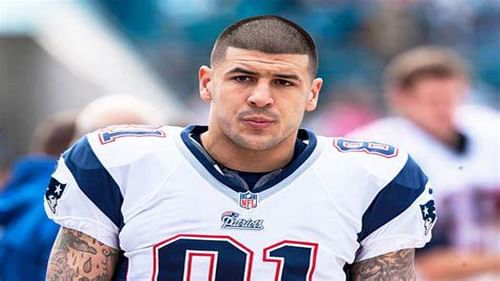
NFL Countdown: Patriots' #81 forever tainted by Hernandez

The story of former Patriots tight end Aaron Josef Hernandez is one of tragedy on every level. It could've been a tale of classic triumph over adversity: the kid with a rough upbringing defying the odds to reach the top in the face of insurmountable hurdles.
Unfortunately for everyone connected with this story, it did not turn out that way. Instead, he is remembered as a murderer who threw away everything and destroyed countless lives before taking his own in a prison cell.
Born in Connecticut, family life for the former Patriot was volatile and defined by fear. Hernandez and his brother Dennis Jr. faced constant beatings from their father Dennis Sr., who happened to be an inconsistent presence in the childrens' early life due to several stints in prison.
Hernandez excelled at the sport of football, spurned on by the threat of violence from his father should he not perform well enough. The youngster soon established his talents on the football field. Scholarship offers followed and he chose to commit to the University of Florida.
Before starting his college career, his father would pass away from hernia surgery complications and a 16-year-old Hernandez would struggle to deal with his grief. He rebelled against authority figures and became deeply involved in street life.
Incredibly, this didn't impact his performance on the field, and he quickly became a star TE in Florida under the guidance of Urban Meyer. He would later admit that he was often high on drugs during practice and games while in Florida.
Standing at 6'2" and weighing 245 pounds with 4.6 speed, his 111 catches for Florida were a school record for tight ends. Consequently, entering the 2010 draft, Hernandez was a highly regarded prospect.
However, many teams saw major red flags. He admitted to failing a drug test and his links to street gangs were unearthed while teams were completing their due diligence.
Due to this, he fell into the fourth round where he was selected by Bill Bellichick's New England Patriots, two rounds after they had taken fellow TE Rob Gronkowski.
When the 2010 season began, Hernandez was the league's youngest player. However, he wasted no time in establishing his dominance as he made 45 grabs for 563 yards and six touchdowns, which saw him earn the rookie record for a Patriots TE.
As the Patriots started to employ more use of "12 personnel," his role grew and he formed a fearsome partnership with fellow TE draftee Rob Gronkowski. The two formed a duo that is widely credited for transforming the TE position. The former University of Florida star was rewarded for his efforts in 2012 when he signed a five-year, $40 million contract extension that included a signing bonus of $12.5 million.
On the field, number 81 was a popular target that garnered a lot of attention. However, off the field, he was considered a loner and an unpopular member of the roster who seemed to revel in being the outcast.
His behaviour deteriorated to the point that Belichick was preparing to release him as teammates also questioned his mental health. On top of his locker room situation, fate would crully intervene.
Hernandez's Murder of Odin Lloyd
Odin Lloyd was a semi-pro football player and the boyfriend of Shaneah Jenkins, the sister of Aaron Hernandez's fiancé.
On June 17, 2013, his body was found in an industrial park a mile from the Patriot's mansion in North Attleborough, Massachusetts. Police did not take long to connect the dots and soon arrived to search Hernandez's home the very next day.
However, the Patriots TE had already destroyed his home surveillance footage and his personal mobile. He even went the extra mile, hiring a team of home cleaners prior to the police's arrival.
As the news broke, Patriots owner Robert Kraft and head coach Bill Belichick met with the player.
Though the tight end assured them of his innocence, he was charged with first-degree murder the following week and was subsequently cut from the team. He would not face trial until April 2015, when facts surrounding the case would finally be revealed.
In their opening statement, the prosecution stated that they had found Hernandez's DNA at the scene, and that mobile phone records placed Lloyd and the NFL star together on the night of his death. Two friends of the football star were also present on the scene.
He would later admit to being at the murder scene, but blamed his friends, Carlos Ortiz and Ernest Wallace, for the killing. The jury did not believe him and he was convicted of the first-degree murder of Lloyd and sentenced to life in prison without the possibility of parole.
Hernandez was to start his sentence at MCI Cedar Junction, which is just 2 miles from Gillette Stadium. No motive for the murder was ever established, but it was rumored to have been linked to a 2012 double homicide in Boston, for which Hernandez was later tried and aqquited of.
After his conviction, reports of further incidents involving the former TE started to surface, highlighting a consistent pattern of aggressive behaviour involving guns.
While in prison, he spoke highly of some of his old teammates, especially Tom Brady, who is thought to have been closest to him. The former tight end still had severe drug issues while incarcerated and was disciplined on multiple occasions for breaching prison rules.
On April 19, 2017, Hernandez was found hanging in his cell, having used his bedsheet as a noose. In the wake of his death, Massachusetts Superior Court vacated his murder conviction because he had died before his appeal was heard. However, in 2019, the Massachusetts Supreme Court would reinstate it, following an appeal by the family of Odin Lloyd.
The story is undoubtedly tragic on many levels and various explanations have been offered, including severe CTE, which has been confirmed he was suffering from.
Ultimately, many families have been left to deal with the aftermath of Hernandez's actions, including his own. It remains sad to consider that it could have all been very different for number 81.